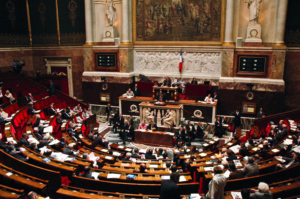France’s Inflation Relief Package

Similar to other European countries, the French parliament recently passed a series of bills to help citizens cope with the effects of high inflation that the Russia-Ukraine War caused. In addition to France’s inflation relief package, its energy supply system and international deals further protect its citizens from the direst effects of the energy crisis.
The €20 Billion Reform Package
In early August 2022, the French parliament passed a €20 billion package to offset the cost of the living crisis that the rising inflation caused as part of the PLFR, the 2022 amending finance bill. The bill includes:
- Increasing welfare payments and pensions by 4%
- Increasing fuel rebates from €0.18 a liter to €0.30 a liter from September to October
- Increasing the coefficient used to calculate civil servants’ salaries
- Prompting private companies to provide employees with tax-free bonuses of up to €6,000.
France’s inflation relief package continues measures the government took early in the year to cope with rising gas and electricity prices. Along with reducing electricity and fuel taxes, the government provided 5.8 million lower-income households with a one-off payment of €100. Separately, the government also called for energy sobriety measures to reduce business and individual energy consumption.
Subsidy measures and one-off payments, however, are also common in other western nations. The U.K. announced more generous one-off payments for pensioners and disabled people along with an energy bill discount for every household. The Institute of Fiscal Studies estimates the U.K.’s reforms will cost about £19 billion (about $22 billion), similar to France’s spending.
Yet, the average British household will likely see their bills triple in size compared to last year while French bills will stay relatively the same. What differentiates France’s inflation relief is the government’s regulation of electricity supply.
France’s Shelter from the Energy Crisis
According to calculations by Bruegel, a Brussels-based think-tank, France will spend about €50 billion to protect its citizens from the effects of the energy crisis by 2030. France is the third greatest spender in Europe after Germany and Italy, which Bruegel estimated will spend €60.2 billion and €49.2 billion, respectively.
In addition to the €20 billion 2022 PLFR, the government demanded that EDF, the 85% state-owned monopoly energy supplier, augment its number of discounted electricity offers in January. As a result, the brunt of the crisis hit EDF rather than the citizens. The discounts and state subsidies greatly shelter French households from the energy crisis.
France’s inflation relief method contrasts with Britain’s, where Ofgem, an energy regulator, determines price caps to protect consumers while maintaining supplier profit margins. The British model encourages using renewable energy and nuclear power by putting cheaper sources at the forefront of supply. Still, it fails to protect its users when the price of wholesale gas increases. Since the beginning of the Russia-Ukraine War, British gas costs increased more than six times. As the energy suppliers are not state-owned, consumers and suppliers are compelled to pay more. The government has not yet announced energy subsidies.
International Ties
As part of the European Union, France also follows reforms taken within the bloc, which saw the euro hit a record 8.6% inflation rate. By March 2023, the EU aims to reduce gas consumption by 15%, which amounts to about a third of the gas it imported from Russia in 2021.
France also took steps to diversify its supply. Along with temporarily re-opening a coal power plant in Saint-Avold to generate electricity, France will send Germany and Belgium excess gas. In exchange, the neighboring states will supply up to 70% of France’s electricity.
As Russia completely cut off natural gas supplies for the nation in June, France switched to energy suppliers from Norway, the United States, the Gulf and Algeria. Furthermore, Emmanuel Macron chose to go to the United Arab Emirates for his first presidential visit after his re-election. The resulting strategic energy cooperation agreement secured fuel and gas supplies for the western nation and re-established relations with the UAE.
The Impact of Combined Efforts
France’s inflation relief follows a multi-lateral approach. International agreements, state intervention in energy supply, and welfare measures combine to tackle the process from multiple angles. As a result, citizens do not suffer the most significant effects of rising energy. The reforms especially shelter lower economic classes, which feel the cost of living crisis the most strongly and present a step forwards in addressing the most salient issue for French voters.
– Elena Sofia Massacesi
Photo: Flickr
